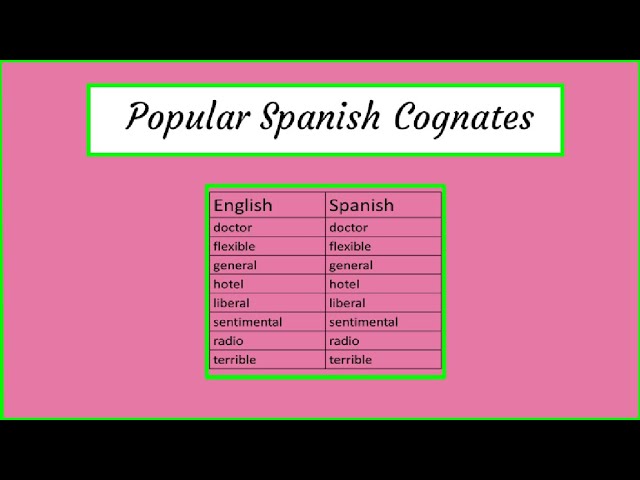Understanding Cognates in Spanish: A Comprehensive Guide
Cognates are an essential aspect of language learning, particularly for English speakers studying Spanish. They provide a bridge between the two languages, making vocabulary acquisition more manageable and intuitive. This article will explore what cognates are, their significance in language learning, the different types of cognates, and how to effectively use them in Spanish. Additionally, a comprehensive FAQ section and a table summarizing key information will be included.
What Are Cognates?
Cognates are words in two languages that share a similar meaning, spelling, and pronunciation due to a common origin. In the case of Spanish and English, many cognates derive from Latin, which is the root of many words in both languages. This shared etymological background allows English speakers to recognize and understand a significant number of Spanish words without extensive study.
The Importance of Cognates in Language Learning
For English speakers, cognates serve as a valuable tool in learning Spanish. They can:
- Accelerate Vocabulary Acquisition: Since many cognates look and sound similar, learners can quickly expand their vocabulary by recognizing familiar words.
- Enhance Comprehension: Understanding cognates can help learners make educated guesses about the meanings of unfamiliar words, improving reading and listening comprehension.
- Boost Confidence: Knowing that a large portion of Spanish vocabulary consists of cognates can motivate learners and reduce the intimidation factor often associated with learning a new language.
Types of Cognates
Cognates can be categorized into three main types:
- Perfect Cognates: These are words that are spelled and pronounced the same in both languages, with the same meaning. For example, “animal” in English is “animal” in Spanish.
- Near-Perfect Cognates: These words are similar but may have slight differences in spelling or pronunciation. For instance, “information” in English is “información” in Spanish.
- False Cognates: Also known as false friends, these words appear similar but have different meanings. For example, “embarrassed” in English translates to “avergonzado” in Spanish, while “embarazada” means “pregnant.”
Examples of Cognates
To illustrate the concept of cognates, here are some examples from each category:
Perfect Cognates
| English | Spanish |
|---|---|
| Animal | Animal |
| Hospital | Hospital |
| Doctor | Doctor |
| Chocolate | Chocolate |
| Festival | Festival |
Near-Perfect Cognates
| English | Spanish |
|---|---|
| Information | Información |
| Celebration | Celebración |
| Family | Familia |
| Actor | Actor |
| Different | Diferente |
False Cognates
| English | Spanish | Meaning in Spanish |
|---|---|---|
| Actual | Actual | Current |
| Library | Librería | Bookstore |
| Sensible | Sensato | Rational |
| Assist | Asistir | To attend |
| Fabric | Fábrica | Factory |
Patterns in Cognate Formation
Understanding patterns in cognate formation can help learners identify cognates more easily. Here are some common patterns:
- Words ending in -al: These often remain the same in both languages (e.g., “animal” and “hospital”).
- Words ending in -tion: Spanish words ending in -ción correspond to English words ending in -tion (e.g., “información” and “information”).
- Words ending in -ous: Spanish words ending in -oso correspond to English words ending in -ous (e.g., “delicioso” and “delicious”).
- Words ending in -ary: Spanish words ending in -ario correspond to English words ending in -ary (e.g., “salario” and “salary”).
How to Use Cognates Effectively
To maximize the benefits of cognates in Spanish learning, consider the following strategies:
- Practice Recognition: Familiarize yourself with common cognates and their meanings. Flashcards can be a useful tool for this.
- Read in Context: Engage with Spanish texts that include cognates. This will help reinforce your understanding and recognition of these words in context.
- Be Cautious with False Cognates: Pay attention to false cognates, as they can lead to misunderstandings. Make a list of common false cognates to avoid confusion.
- Use Cognates in Conversation: Incorporate cognates into your spoken Spanish. This will help you feel more comfortable and confident when communicating.
Cultural Significance of Cognates
Cognates also reflect the historical and cultural connections between languages. The influence of Latin on both Spanish and English highlights the shared roots of many modern languages. This connection can foster a deeper appreciation for the languages and cultures involved.
FAQ Section
1. What are cognates?
Cognates are words in two languages that share a similar meaning, spelling, and pronunciation due to a common origin.
2. What are the types of cognates?
Cognates can be classified into three types: perfect cognates, near-perfect cognates, and false cognates.
3. Can you give examples of perfect cognates?
Examples of perfect cognates include “animal,” “hospital,” and “doctor.”
4. What are false cognates?
False cognates are words that appear similar in two languages but have different meanings, such as “actual” (meaning “current” in Spanish) and “embarrassed” (which translates to “avergonzado”).
5. How can cognates help in learning Spanish?
Cognates can accelerate vocabulary acquisition, enhance comprehension, and boost confidence in language learning.
6. Are all cognates spelled the same in both languages?
No, only perfect cognates are spelled the same. Near-perfect cognates have slight differences, while false cognates may look similar but have different meanings.
7. How can I practice recognizing cognates?
You can practice recognizing cognates by using flashcards, reading Spanish texts, and engaging in conversation that incorporates cognates.
8. Why should I be cautious with false cognates?
False cognates can lead to misunderstandings, so it’s essential to be aware of their actual meanings to avoid confusion.
Information Table
| Attribute | Details |
|---|---|
| Definition | Words with similar meaning, spelling, and pronunciation in two languages |
| Types of Cognates | Perfect, Near-Perfect, False |
| Examples of Perfect Cognates | Animal, Hospital, Doctor |
| Examples of Near-Perfect Cognates | Información, Celebración |
| Examples of False Cognates | Actual (current), Library (bookstore) |
For more detailed information about cognates, you can refer to the Wikipedia page: Cognate – Wikipedia.
Conclusion
Cognates play a crucial role in language learning, particularly for English speakers studying Spanish. By understanding the types of cognates, recognizing patterns, and practicing their use, learners can significantly enhance their vocabulary and comprehension skills. Embracing cognates not only facilitates language acquisition but also deepens cultural understanding, making the journey of learning Spanish both enjoyable and rewarding.



